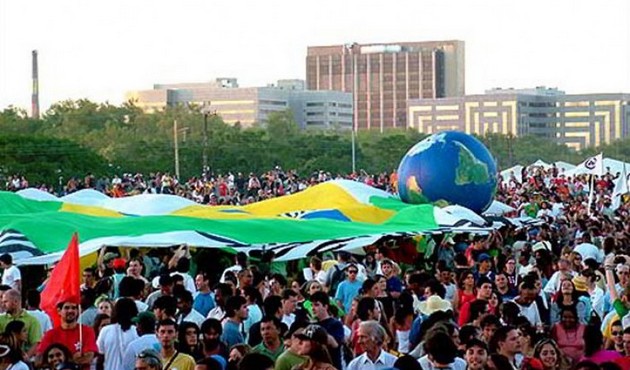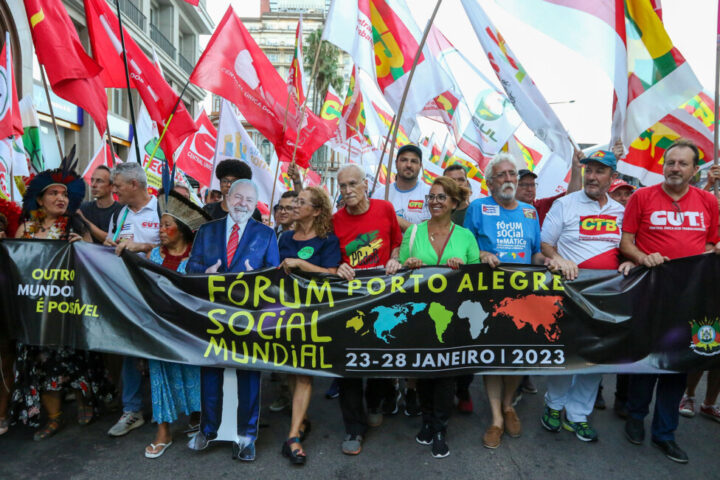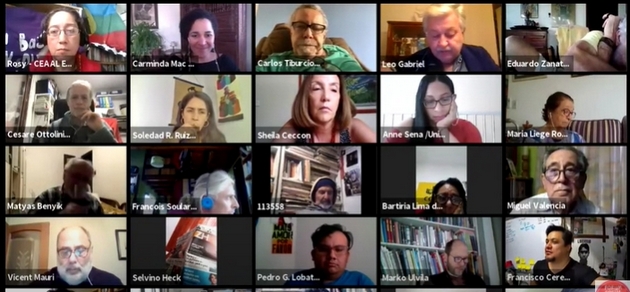ARTICLE AD
 A poster of the World Social Forum in Kathmandu, to be held Feb. 15-19, 2024. This is the second time that the Forum is holding its world meeting in Asia. The first was in Mumbai, India, in 2004, when it was attended by 111,000 people. CREDIT: WSFby Mario Osava (rio de janeiro)Tuesday, February 13, 2024Inter Press Service
A poster of the World Social Forum in Kathmandu, to be held Feb. 15-19, 2024. This is the second time that the Forum is holding its world meeting in Asia. The first was in Mumbai, India, in 2004, when it was attended by 111,000 people. CREDIT: WSFby Mario Osava (rio de janeiro)Tuesday, February 13, 2024Inter Press ServiceRIO DE JANEIRO, Feb 13 (IPS) - The World Social Forum (WSF) is today "more necessary than ever," according to Oded Grajew, promoter and co-founder of the global civil society meeting - a festival of diversity that has not yet succeeded in fomenting or designing the "other possible world" that it predicted when it was created and adopted that motto.
The WSF, whose next edition will be held Feb. 15-19 in Kathmandu, the capital of Nepal, first emerged in 2001 in Porto Alegre, a city in southern Brazil, at the initiative of Brazilian organizations and social movements, in coordination with international groups.
The idea proposed by Grajew was to hold a counterpoint to the World Economic Forum, which meets annually in the Swiss Alps city of Davos. Hence the similar name but different focus, on social issues, the initial coincidence of dates in January, and the banners against neoliberalism and globalization.
The first edition brought together nearly 20,000 people from 117 countries. Participation grew and exceeded 100,000 people in several global meetings held in different countries, after the first three held in Porto Alegre, where it has returned on several occasions.
The meetings took place in the Indian city of Mumbai in 2004, then in 2006, the WSF was divided between Bamako (Mali) and Caracas, to be followed by Nairobi (2007), Dakar (2011), Tunis (2013 and 2015) and Mexico City (2022).
In addition to Porto Alegre, it returned to Brazil in 2009 (Belém, in the eastern Amazon) and 2018 (Salvador, in the northeast). And it expanded into national, regional and thematic forums, promoting debates on a range of issues, from economic to environmental and climate, gender, ethnic, sexual minorities, and disabilities questions.
But the WSF has been in decline since the last decade. It has lost its initial charm and repercussions, and its current impact on global crises is hardly noticeable, especially since it was born as a movement that did not aim to reach conclusions, but rather to generate debates and demonstrate that "another world is possible."
"We are losing the game so far," Grajew told IPS by telephone from Sao Paulo. "The climate crisis has worsened, inequalities and conflicts have grown, with the risk of nuclear war, confidence in democracy is declining and global governance is lacking. These are enormous risks that threaten the human species."
All of this increases the need to revitalize the WSF, because it is about strengthening civil society, the only way to solve the challenges, in the view of its organizers.
The WSF, despite everything, has already left a legacy as a "space for making connections and mounting resistance by society around the world," Grajew said. It contributed to raising the visibility of the climate emergency on the international agenda, strengthened the anti-racist struggle and fostered alliances that made indigenous peoples "political actors in a way that they were not before," he said, to illustrate.
In Brazil, it was the increasingly strong civil society that prevented a coup d'état that would have installed a dictatorship and returned the far-right former president Jair Bolsonaro to office, said Grajew, currently an advisor to several institutions and president emeritus of the Ethos Institute for Business and Social Responsibility, a businessman turned social activist who remains so at the age of 80.
 A picture from one of the first editions of the World Social Forum, in the Brazilian city of Porto Alegre, showing the globe seen from the South, which has been a repeated part of its logos, as well as its slogan: "Another world is possible". The assembly style that does not reach conclusions has been at the same time the strength and weakness of the movement. CREDIT: Claes
A picture from one of the first editions of the World Social Forum, in the Brazilian city of Porto Alegre, showing the globe seen from the South, which has been a repeated part of its logos, as well as its slogan: "Another world is possible". The assembly style that does not reach conclusions has been at the same time the strength and weakness of the movement. CREDIT: ClaesSolutions and resources are available
"Today we know what the problems of humanity are and how to solve them; what is lacking is political will," Grajew argued.
"Our problem is not economic, it's not a lack of resources; it's a problem of political and social organization," said Ladislau Dowbor, an 83-year-old economist who always addresses the WSF. "Global GDP is 100 trillion dollars per year, equivalent to 4,200 dollars a month per family of four people. It is enough for a decent and comfortable life for all. All that would be needed is a tax of only four percent on the fortunes of the richest one percent of humanity."
The WSF is an attempt to create a connected political force from the profusion of organizations and social movements in which civil society seems to be fragmented, with a multiplicity of banners, from environmental to feminist, anti-racist and egalitarian.
There was an explosion of social diversity in the 1960s and 1970s, with the affirmation of multiple identities and their struggles, which seek convergence in processes such as the WSF. These are generally progressive movements, which are not automatically connected together.
The most immediate antecedent was the so-called "Battle for Seattle," the city in the northwest U.S. state of Washington that in 1999 brought together anti-globalization activists during a World Trade Organization summit, demanding globalization of the people and not of the economy.
"It's a long-term process. Diversity is a richness, but sometimes it is divided by identity sectarianism," said Daniel Aarão Reis, a 78-year-old historian who extensively studied Brazil's 1964-1985 military dictatorship and the Soviet revolution.
In his view, the consolidation of opposition to or containment of the damage caused by capitalism in the current situation faces two adverse factors.
"One is the decline of the working class, which since the late nineteenth century, concentrated in the cities, had a demographic weight and organized strength to lead that struggle, attracting other popular segments, which were sometimes even a majority of the population, such as peasant farmers. But it has suffered demographic losses, slow but evident since the 1970s," Aarão Reis said.
Another is the collapse of the Soviet Union in 1991, which gave way to unbridled capitalism, with the "restoration of tsarist traditions." This hit progressive forces even if they were critical of authoritarian socialism. For a long period Moscow had supported, for example, national liberation struggles.
 Photo of a march of the Thematic Social Forum on Older Adults in Porto Alegre, southern Brazil, in January 2023. Thematic, national and regional forums proliferated around the world after the first global meetings of the World Social Forum in Porto Alegre, from 2001 to 2003, and in Mumbai, India, in 2004. CREDIT: Tânia Rego / Agência Brasil
Photo of a march of the Thematic Social Forum on Older Adults in Porto Alegre, southern Brazil, in January 2023. Thematic, national and regional forums proliferated around the world after the first global meetings of the World Social Forum in Porto Alegre, from 2001 to 2003, and in Mumbai, India, in 2004. CREDIT: Tânia Rego / Agência BrasilFar right can unite progressives
"Creating connections between the myriad of dispersed currents, without a powerful hub such as workers' struggles, with their unions and parties, is a great challenge. But sometimes an external enemy helps foment these connections. That was the case of Nazism, which gave rise to a broad alliance against it," the historian said in an interview with IPS in Rio de Janeiro.
The far right, which brings together racism, threat to democracy, misogyny and other retrograde stances, can "help condense that dispersed nebula that the left has become," said Aarão Reis, a professor at the Fluminense Federal University.
In the case of the WSF, its apparent loss of momentum exacerbated internal divisions in the International Council which is responsible for managing the forum.
"The WSF is like the spiritual exercises of the church, which benefit those who are present, but are basically internal, and don't spread to society," by not expressing itself on the burning issues of the world and thus making it impossible to communicate outwardly, Argentine- Italian Roberto Savio, co-founder and president emeritus of Inter Press Service (IPS), who was an active member of the International Council, said from Rome.
This is how the 89-year-old expert on South-South communications described the disagreement of some activists and advisers with the Charter of Principles that defines the WSF as "a plural and diversified space" of reflection and connection of entities and movements, that is "non-partisan" and "non-deliberative."
 Screenshot from the closing assembly, on Jan. 31, of the World Social Forum 2021, which was held only in digital format that year. The difficulties of organizing an unprecedented online meeting did not prevent, according to the organizers, 9,561 participants from 144 countries and 1,360 organizations from taking part in 751 activities, including workshops, round tables, debates and sectoral assemblies. CREDIT: Mario Osava / IPS
Screenshot from the closing assembly, on Jan. 31, of the World Social Forum 2021, which was held only in digital format that year. The difficulties of organizing an unprecedented online meeting did not prevent, according to the organizers, 9,561 participants from 144 countries and 1,360 organizations from taking part in 751 activities, including workshops, round tables, debates and sectoral assemblies. CREDIT: Mario Osava / IPSNot a party
Chico Whitaker, another co-founder of the Forum and a fervent defender of the Charter of Principles, said "We have to continue being a space for connection, for the search for alternatives and forms of action, for new paths. Action is a function of the participating organizations and movements, not of the Forum."
The discrepancy has existed since the beginning of the WSF and stems from "an old culture of hierarchical, autocratic politics," he told IPS by telephone from São Paulo.
At 92 years of age, Whitaker regretted that he was not able to travel to Kathmandu which was "too far away," and that he would be engaged in "very limited" digital participation.
The edition in Kathmandu will be hybrid, both face-to-face and digital, but the time zone difference between the capital of Nepal and São Paulo, for example, is nine hours, which makes it difficult to follow the activities from afar.
That is why the debates of greatest interest in the Americas will be held at night in the Nepali capital, said Rita Freire, representative of the Ciranda network, which is in charge of the WSF collaborative communication at the International Council.
Freire, a 66-year-old journalist and editor of the Middle East Monitor, also represents an alternative of political action "within the process of the Forum, but maintaining the Charter of Principles."
A new body is being tested in Kathmandu, the Assembly of Struggles and Resistance with social movements, which will adopt political positions and declarations. "But it will do so in its own name and not in the name of the Forum," Freire clarified from São Paulo by telephone a few hours before taking a flight to Kathmandu.
Holding the gathering in Asia opens new horizons for the WSF, as it is the most dynamic region of the global South, at least in economic terms, agreed Freire and Whitaker. It reflects a mobilization of the social organizations of Nepal and neighboring countries, which came together and offered to host the Forum.
© Inter Press Service (2024) — All Rights ReservedOriginal source: Inter Press Service

 10 months ago
77
10 months ago
77 
